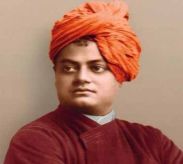Swami Vivekananda
Swami Vivekananda
Editorial team
theteacher.in

Swami Vivekananda, known in his pre-monastic life as Narendranath Datta, was born in an affluent family in Kolkata on 12 January 1863. A lover of mankind, he strove to promote peace and human brotherhood.
Swami Vivekananda's inspiring personality was well known, both in India and in America during the last decade of the nineteenth century and the first decade of the twentieth century. The unknown monk of India suddenly leapt into fame at the Parliament of Religions held in Chicago in 1893, at which he represented Hinduism. “Sisters and brothers of America”, these loving words were enough to captivate everyone. His popularity was described aptly by the Boston evening transcript, a local newspaper, which stated four thousand people in the hall of Columbus would sit smiling and expectant waiting an hour or two of speeches of other men to listen to Swami Vivekananda for fifteen minutes.
After the Parliament of Religions, he toured many parts of the US as a guest. Swami Vivekananda spent nearly two years lecturing in the eastern and central United States, primarily in Chicago, Detroit, Boston, and New York. Due to deteriorating health, he ended his lecture tours and began giving free, private classes in vedanta and yoga. Beginning in June 1895, Vivekananda gave private lectures at Thousand Island Park in New York for two months. During his first visit to the West, he travelled to England twice, in 1895 and 1896, lecturing successfully there. Vivekananda was offered academic positions in two American universities (one was the chair in Eastern Philosophy at Harvard University and a similar position at Columbia University); he declined both, since his duties would conflict with his commitment as a monk.
In India, he repeatedly addressed social issues like uplifting the people, eliminating the caste system, promoting science and industrialisation, addressing widespread poverty and ending colonial rule. These lectures, published as ‘Lectures from Colombo to Almora’, demonstrate his nationalistic fervour and spiritual ideology.
12th January, the birthday of Swami Vivekananda, is observed as 'National Youth Day' in India. A spiritual genius of commanding intellect and power, Swami Vivekananda crammed immense labour and achievement into his short life of thirty nine years. His vast knowledge of Eastern and Western culture as well as his deep spiritual insight, fervid eloquence, brilliant conversation, broad human sympathy, colourful personality, and handsome figure made an irresistible appeal to the ones who came in contact with him. People who saw or heard Swami Vivekananda always cherished his memory.





















